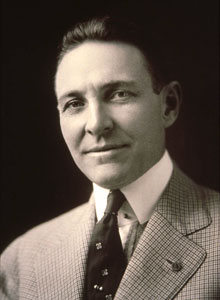* The Rotary Foundation Month - “for the purpose of doing good in the world”
 In 1917, RI President Arch C. Klumph proposed that an endowment be set up “for the purpose of doing good in the world.” In 1928, when the endowment fund had grown to more than US$5,000, it was renamed The Rotary Foundation, and it became a distinct entity within Rotary International.
In 1917, RI President Arch C. Klumph proposed that an endowment be set up “for the purpose of doing good in the world.” In 1928, when the endowment fund had grown to more than US$5,000, it was renamed The Rotary Foundation, and it became a distinct entity within Rotary International.
Five Trustees, including Klumph, were appointed to “hold, invest, manage, and administer all of its property . . . as a single trust, for the furtherance of the purposes of RI.”
Two years later, the Foundation made its first grant of $500 to the International Society for Crippled Children. The organization, created by Rotarian Edgar F. “Daddy” Allen, later grew into the Easter Seals.
The Great Depression and World War II both impeded the Foundation’s growth, but the need for lasting world peace generated great postwar interest in its development. After Rotary’s founder, Paul P. Harris, died in 1947, contributions began pouring into Rotary International, and the Paul Harris Memorial Fund was created to build the Foundation.
That year, the first Foundation program – the forerunner of Rotary Foundation Ambassadorial Scholarships – was established. In 1965-66, three new programs were launched: Group Study Exchange , Awards for Technical Training, and Grants for Activities in Keeping with the Objective of The Rotary Foundation, which was later called Matching Grants .
The Health, Hunger and Humanity (3-H) Grants program was launched in 1978, and Rotary Volunteers was created as a part of that program in 1980. PolioPlus was announced in 1984-85, and the next year brought Rotary Grants for University Teachers . The first peace forums were held in 1987-88, leading to the Foundation's peace and conflict studies programs .
Throughout this time, support of the Foundation grew tremendously. Since the first donation of $26.50 in 1917, it has received contributions totaling more than $1 billion. More than $70 million was donated in 2003-04 alone. To date, more than one million individuals have been recognized as Paul Harris Fellows – people who have given $1,000 to the Annual Programs Fund or have had that amount contributed in their name.
While it is an honor to receive a Paul Harris Fellow, it’s not about the recognition; it’s about what we can do in the World as Rotarians.
In the year 1956, the total contributions to The Rotary Foundation were a little less than $500,000 US dollars ($493,722 to be exact). The Trustees began to think about how they could raise more money for the Foundation. What would be a good way to encourage Rotarians to give "big money"?
The Trustees finally came up with the idea of trying to get some Rotarians to give $1000 in one major gift, by giving them a special form of public recognition. So, it was suggested that we call them "Paul Harris Fellows."
The Paul Harris Fellowship is named for Paul Harris, who founded Rotary over 100 years ago. Every Paul Harris Fellow receives a pin, medallion and a certificate when becoming a Fellow. This identifies the Paul Harris Fellow as an advocate of the Foundation's goals of world peace and international understanding.
Polio..... and It's Eradication
Polio Eradication – “You can do it” from Rotary International on Vimeo.
After 25 years of hard work, Rotary and its partners are on the brink of eradicating this tenacious disease, but a strong push is needed now to root it out once and for all. It is a window of opportunity of historic proportions.
Reaching the ultimate goal of a polio-free world presents ongoing challenges, not the least of which is a US$535 million funding gap through 2012. Of course, Rotary alone can't fill this gap, but continued Rotarian advocacy for government support can help enormously.
As long as polio threatens even one child anywhere in the world, children everywhere remain at risk. The stakes are that high.
Such strong support, along with Rotarian involvement worldwide, ensures a secure future for The Rotary Foundation as it continues its vital work for international understanding and world peace.
Download the website sponsorship guide